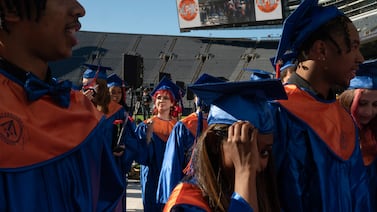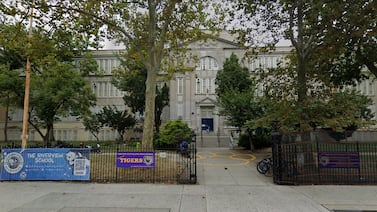This story was originally published on Dec. 10 by THE CITY.
Nine months after the coronavirus pandemic forced a move to remote learning, children in juvenile detention may finally be heard by their teachers while in class.
Officials with the city’s Administration for Children’s Services and Department of Education say they are looking into programs that would allow secure voice communication for pupils behind bars, as well as expanded tutoring services.
The moves follow reporting by THE CITY that showed children in detention facilities are kept off camera and on mute during remote learning, which advocates and teachers decry as undermining the education of some of the city’s most vulnerable kids.
Both city agencies highlighted concerns that children may use online voice and video technology to communicate with people other than teachers or counselors.
Education and child welfare officials said Wednesday they are working together to test new ways to bring audio and possibly even video communication to kids.
The timetable, though, wasn’t clear — and any changes would need to be approved by the state, according to the city DOE.
“Our staff does incredible work to deliver live, high-quality remote instruction to our students in the juvenile justice system, and we are working quickly to add video and audio capabilities to their school day,” said Miranda Barbot, a Department of Education spokesperson.
“Our priority is the safety of our students, and we’ll continue to partner closely with ACS to expand their communication and educational opportunities,” she added.
When remote learning was thrust onto city learners, the move proved chaotic even for the most advantaged students and families. For the 127 children — most high school age — housed at the New York City’s secure and nonsecure detention centers, the loss of in-person classes was particularly devastating.
‘Challenges on Both Ends’
Children in the city’s most secure facilities initially were given printed-out paper and computerized packets for schoolwork. Additional supportive educational programming was available on tablets that could be taken away as discipline, according to testimony to the City Council in May by ACS and juvenile justice advocates.
For a two-month period in early fall, limited in-person instruction returned to youth learning behind bars. But since city schools shut back down in mid-November, kids in city detention centers have been relegated to learning on DOE-issued Chromebooks, without the ability to be seen or heard by their teachers during class.
The students are only able to communicate with teachers through a “text-messaging feature” during live instruction and by phone after school hours, according to ACS.
Teachers with Passages Academy, the city’s network of schools for so-called court-involved youth, have told THE CITY that kids who are “low-level readers” have particular trouble with the chat-only system.
“It’s hard to imagine the challenges on both ends” for students and teachers, said Anna Arkin-Gallagher, supervising attorney and policy counsel on the education unit at Brooklyn Defender Services.
She noted that teachers have to give instruction “without being able to see and hear their students and see how they’re responding to what they’re learning.”
Arkin-Gallagher, who represents multiple children in lockup, told THE CITY that she would like to see a specific timeline for implementation of a voice communications system, calling the current setup “really concerning.”
When THE CITY asked for rollout dates, neither the DOE nor ACS responded.
More Tutoring Sought
Even before the pandemic, classes at Horizon Juvenile Center in The Bronx were found to be “hampered by chronic tardiness,” with kids arriving to classes on average nearly an hour late last November, according to a May report by the federal monitor overseeing city correctional facilities.
The need for more in-person support is crucial to get kids to participate in online classes, said Laurel Gwizdak Rinaldi, director of youth services at the Center for Community Alternatives, which runs programming at Horizon.
New funding from the city has enabled Rinaldi’s group to provide tutoring twice per week at Horizon and Crossroads in Brooklyn for a limited number of students. But young people need in-person support every day of the week to ensure engagement, Rinaldi told THE CITY.
“Additional resources must be made available to meet the tremendous need we see during the school day in the juvenile detention facilities,” she said.
According to the ACS, the city is also looking to provide one-one-on tutoring services across all child detention settings through a grant from the U.S. Department of Justice starting in early next year.
“Quality education is a critical component of our juvenile justice system,” said Marisa Kaufman, an ACS spokesperson. “All youth in detention have access to remote learning through Passages Academy and we are currently working with DOE on a plan that would enhance the school day of these youth while protecting their confidentiality.”







